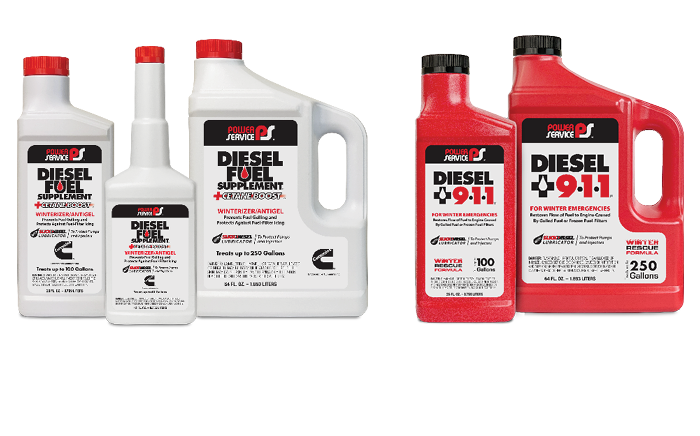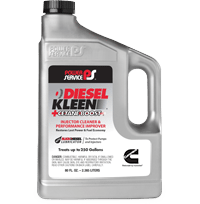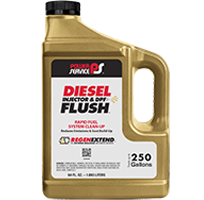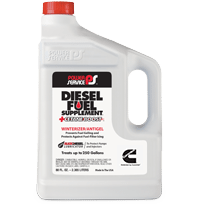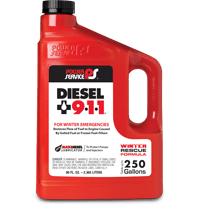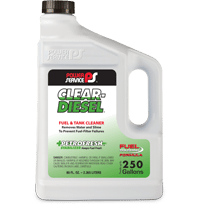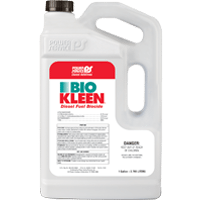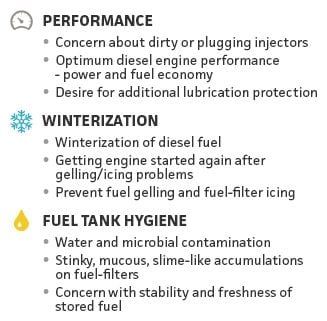Winter Weather and Diesel Fuel: How to Avoid a Breakdown
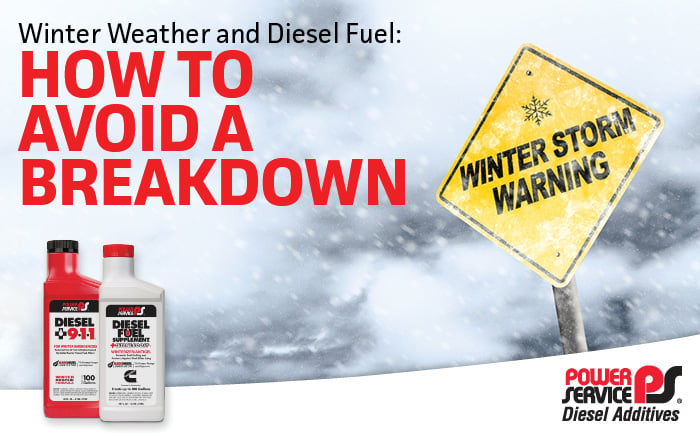
Diesel fuel has unique properties that provide the power and performance you depend on in your vehicle. But there are crucial differences between it and gasoline that are important to understand in the depths of winter.
If you went into a laboratory with instructions to create a liquid fuel capable of providing tremendous low-end torque, high horsepower and the ability to allow a heavy vehicle to cruise efficiently for long distances, you’d emerge with something very similar to diesel fuel swirling around in the lab beaker in your hand.

Diesel fuel is a wonder of the modern age that delivers exceptional performance in heavy-duty vehicles – from long-haul Class 8 tractor-trailers to heavy-duty pickup trucks.
But those unique properties that give diesel fuel such potency in your engine also come with some substantial differences from gasoline. And it’s important to understand these properties so that you can properly manage them to ensure a long, productive and dependable life for your diesel powertrain.
Winter operability of diesel fuel is measured by three primary data points. Let’s go through each one to learn what they are, why they’re important, and what you need to do about each one to ensure proper wintertime performance from your engine.
What is the Cloud Point in diesel fuel?

The first diesel fuel property you need to understand is called Cloud Point. And, in this case, it’s a name that perfectly fits the condition it describes.
If you use diesel fuel long enough, eventually on a cold day you’ll come across a batch of fuel that appears to be clouded by some substance. That’s because it is. Diesel fuel contains paraffin, which is a flammable, translucent, waxy solid distilled from petroleum. And the key word here, in terms of diesel fuel Cloud Point, is waxy. That’s because, at certain low temperatures, paraffin begins to change as wax crystals start to form in the fuel, giving it a distinctly cloudy appearance.
The Cloud Point for the diesel in your tank can be tricky to determine. That’s because a fuel’s Cloud Point varies depending on the type of diesel you have in your tank, how much paraffin it contains, and what other blends of diesel have been mixed with that fuel. But, generally speaking, #2 diesel fuel has a Cloud Point from -18 to 20 degrees F. (-28 to -7 degrees C.), while #1 diesel fuel can withstand temperatures as low as -40 degrees F. (-40 degrees C.). That said, it is impossible to precisely pinpoint the Cloud Point for any given tank of diesel fuel — due to the various blends of fuel likely present in a tank. So, as a general rule of thumb, it’s a good idea to err on the side of caution and treat your fuel with winterizing fluids anytime the temperature drops below 30 degrees F.
It’s important to understand what the Cloud Point is for diesel fuel because, unsurprisingly, the wax crystals that give the fuel its cloudy appearance will clog up fuel filter and injectors over time, bringing your vehicle to a dead stop – often in the dead of winter.
Cold Filter Plugging Point and Pour Point
Compared to gasoline, diesel fuel is highly sensitive to cold temperatures. And this can be a problem in cold climates, because diesel fuel becomes more viscous and starts to gel as temperatures drop.
Your fuel’s Cold Filter Plugging Point is a measurement of this gelling process. Simply put, a tank of diesel fuels’ Cold Filter Plugging Point is the lowest temperature at which fuel will flow freely through the filter and remain operational. Typically, a tank of untreated diesel fuel will reach its Cold Filter Plugging Point 3- to 5-degrees F. below its Cloud Point and then will begin to plug filters. Fuel that has been treated with an antigel typically will not clog filters until the temperature reaches 20-25 degrees F. below the Cloud Point.
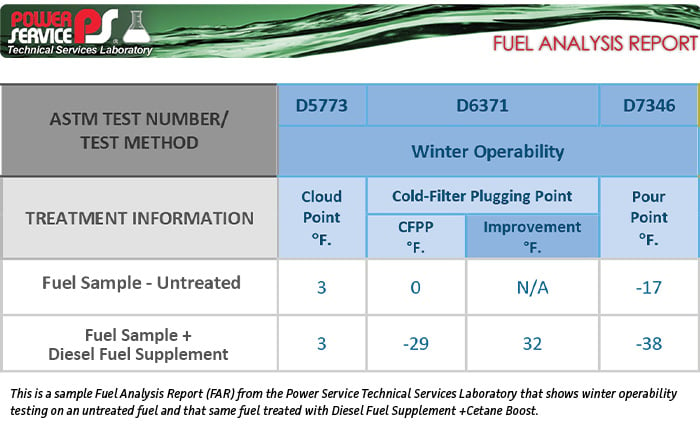
Understanding what the Cold Filter Plugging Point for diesel fuel is definitely is vital for avoiding clogged filters and dead engines in the absolute worst weather conditions imaginable.
Diesel fuel Pour Point is closely related to both the buildup of wax in the fuel and the tendency of diesel to gel as temperatures drop. Pour Point is simply when the wax present in a tank of fuel has solidified so much that fuel becomes solid in consistency and no longer will flow or pour freely.
An Elegant Solution to a Serious Problem
Obviously, given the issues that Cloud Point, Cold Filter Plugging and Pour Point provide for diesel fuel in extreme winter weather, administering preventive maintenance is the best way to avoid a breakdown.
Luckily, finding the peace of mind that comes with knowing your fuel will perform as needed — no matter how hard winter bites — is as simple as adding Diesel Fuel Supplement +Cetane Boost to your fuel tank as soon as temperatures begin to drop.
Power Service winter additives for diesel fuels prevent fuel gelling and keep fuel-filters from plugging with ice and wax. They also work to keep fuel flowing freely through the engine and keep any water present in the fuel from freezing on the facings of fuel-filters, blocking fuel flow.
And, if you find yourself in an emergency situation with a diesel engine that won’t start or gain power in harsh winter temperatures, Power Service Diesel 911 reliquefies gelled fuel and de-ices frozen fuel-filters to restore the flow of diesel fuel to an engine to help get your engine running right.
No one can help your diesel engines battle through even the toughest winters like Power Service can. That’s because we maintain a modern laboratory exclusively dedicated to the health and performance of diesel fuels. Power Service engineers test for Cloud Point, Cold Filter Plugging and Pour Points on thousands of fuel samples every year. That relentless testing has led to the development of a whole line of specialized winter protection fluids for diesel fuels that can ensure safe and efficient diesel engine operations at temperatures 20-25 degrees below that of untreated diesel fuel.
Winter can be tough on diesel fuel. But a little foresight — and some help from Power Service Winter Additives for Diesel Fuel — can help avoid a dangerous breakdown when the temperatures drop and the arctic winds blow.
